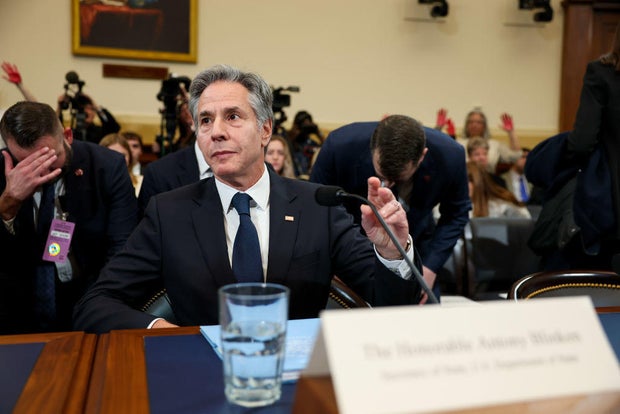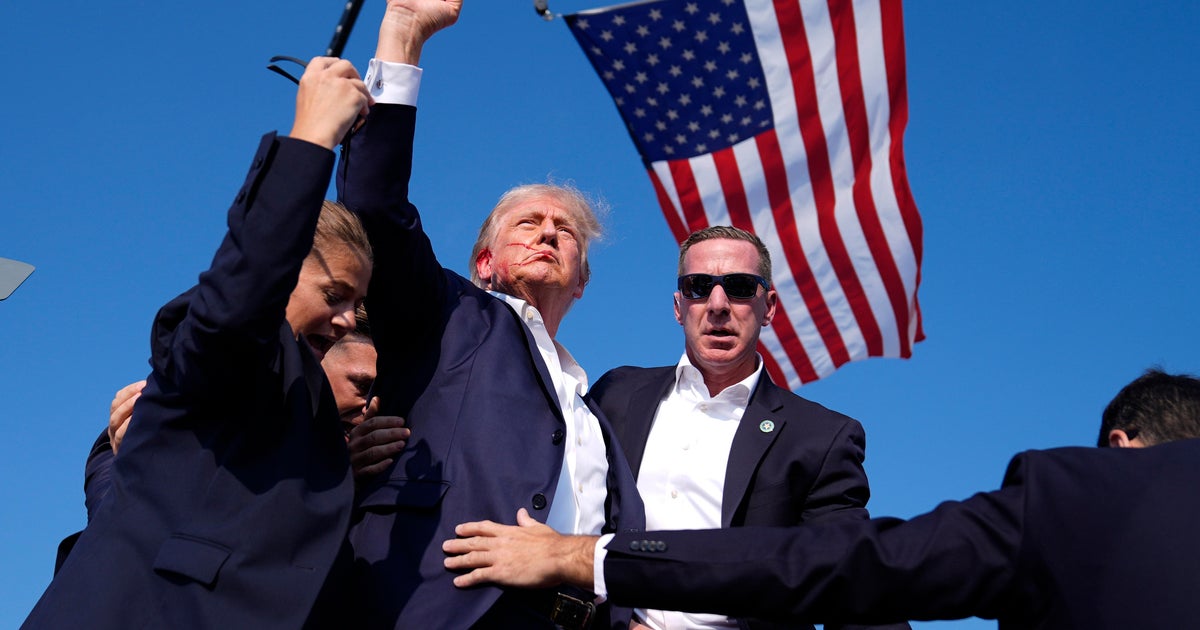Blinken defends Afghanistan withdrawal at contentious House hearing
Washington — Secretary of State Antony Blinken on Wednesday defended President Biden's decision to withdraw from Afghanistan while appearing before the Republican-led House Foreign Affairs Committee, which has long sought to question him over the deadly evacuation.
"I firmly believe the president's decision to withdraw from Afghanistan was the right one," he told lawmakers.
Blinken declined to take the blame for decisions that were made leading up to the exit, explaining that actions taken by the first Trump administration left the Biden administration in a weak position and intelligence assessments expected Kabul to remain the hands of the Afghan government.
Blinken's testimony came nearly three months after the committee voted along party lines to recommend that the nation's top diplomat be held in contempt of Congress amid a standoff over his appearance before the panel to discuss its investigation into the 2021 withdrawal.
The committee and State Department had been at odds for months, leading Rep. Michael McCaul of Texas, the Republican chairman, to issue multiple subpoenas for Blinken to testify in September. McCaul said Blinken's appearance was important as the committee considers "potential legislation aimed at helping prevent the catastrophic mistakes of the withdrawal."
The Afghanistan hearing
"Tragically, more than three years after this administration's disastrous withdrawal, you're finally here to take responsibility," McCaul said Wednesday, also accusing Blinken in the lead up to the evacuation of denying "imminent and dangerous threats to American interests, American citizens and our decade long Afghan partners, all the while, the Taliban captured province after province on their march to Kabul."
Republicans on the committee released a lengthy report in September that detailed their yearslong investigation into the chaotic exit from Afghanistan and accused the Biden administration of misleading the public about the end of the 20-year war.
Rep. Gregory Meeks of New York, the top Democrat on the committee, on Wednesday called the report "partisan and misleading" and said Republicans have "muddled the facts" about whether a suicide bombing that killed 13 U.S. service members was preventable.
Blinken, whose opening statement was repeatedly disrupted by protesters, acknowledged the service members who died and their families, saying he deeply regretted that the U.S. "did not do more and could not do more to protect them."
"To the extent President Biden faced a choice, it was between ending the war or escalating it," Blinken said. "In the three years since the end of our country's longest war. All of us, including myself, have wrestled with what we could have done differently during that period and over the proceeding two decades."
Blinken also acknowledged that the Taliban was not in compliance with a deal the Trump administration struck with the group to withdraw U.S. forces from the country by May 2021. The deal, known as the Doha Agreement, laid out a series of conditions for the Taliban to fulfill in order for U.S. forces to fully leave Afghanistan.
"The Taliban was in violation of the Doha Agreement in a number of ways," he said. "It was in violation when the previous administration drew down forces repeatedly. It was in violation during the time that we were in office before the evacuation."
According to Blinken, the Biden administration unsuccessfully tried to get the Taliban to abide by the conditions and negotiate with the Afghan government.
"They didn't do that," he said. "But because we had the deadline, and because we had the prospect of the Taliban resuming attacks on U.S. forces, which would have required us to put tens of thousands of Americans back into Afghanistan, we followed through with pulling them out."
He said the Doha Agreement "created a tremendous crisis in confidence" in the Afghan government. The Afghan government was excluded from the Trump administration's negotiations with the Taliban that led to the agreement.
Blinken said he was on the phone with then-Afghan President Ashraf Ghani the night before he fled the country as the Taliban closed in.
"He told me that he wanted to continue working on getting an agreement with the Taliban, but if he couldn't, he would stay and fight to the death," Blinken said. "And he left the next day."
Though the U.S. tried to get in contact with every U.S. citizen in the Afghanistan, Blinken said, hundreds who wanted to leave the country did not make it out before the withdrawal. As of now, "every American who identified themselves and said that they wanted to leave has been given an opportunity to do so," he said. But some returned after the withdrawal and have been detained, he said.
"We are working every day to get them out, to get them back," he said.
The committee's report
During its investigation, the committee conducted 18 transcribed interviews with Biden administration officials and received more than 20,000 pages of documents from the State Department, some of which were obtained through subpoenas. Blinken was not among those who testified for the report, but the State Department noted amid the standoff with the committee that he has testified to Congress on Afghanistan more than 14 times.
The report accused President Biden and his administration of ignoring repeated warnings from military officials, national security advisers and U.S. allies about the risks of removing all American forces from Afghanistan, saying Mr. Biden "prioritized politics and his personal legacy over America's national security interests."
Blinken was among those faulted in the report, which said he "remained largely absent throughout the State Department's withdrawal planning" and the evacuation.
"Indeed, witnesses interviewed, and documents produced by federal agencies pursuant to the investigation, confirm Secretary Blinken likely ceded his responsibility to subordinates on Afghanistan," the report said.
Blinken advocated for the U.S. Embassy in Kabul to remain open regardless of the military withdrawal, according to the report, which said that the desire to maintain a diplomatic presence contributed to the State Department's "lack of urgency and their delays in planning for the worst-case scenarios."
The report also noted that diplomatic officials on the ground expressed concerns about the commitment to keep the embassy open despite the deteriorating situation in Afghanistan, culminating in a July 2021 dissent cable warning that Kabul would fall after the planned withdrawal. Two weeks before the U.S. troops left Afghanistan, State Department leaders agreed to shutter the embassy, the report said.
Republicans threatened to hold Blinken in contempt of Congress in 2023 as they sought to review the classified dissent cable. The State Department eventually allowed lawmakers to view a partially redacted version.
"You personally read this, sir," McCaul said while questioning Blinken on Wednesday. "Why did you ignore the cries for help? Why did you leave the embassy open?"
McCaul also said it appeared that Blinken delegated his responsibility and pressed him on who was calling the shots.
"To legislate moving forward, I need to know who was in charge," McCaul said, calling on Mr. Biden's national security adviser Jake Sullivan to testify to the committee.
About 20 minutes later, McCaul announced that Sullivan had agreed to testify on Tuesday.
Democrats on the House Foreign Affairs Committee accused Republicans of politicizing the withdrawal and said the majority took "particular pains to avoid facts involving former President Donald Trump."
Last year, the White House released its own 12-page summary of a classified review of the Afghanistan exit that largely blamed the Trump administration for the Doha Agreement. Another report partially declassified and released by the State Department last year faulted both the Trump and Biden administrations for "insufficient" planning surrounding the withdrawal.




